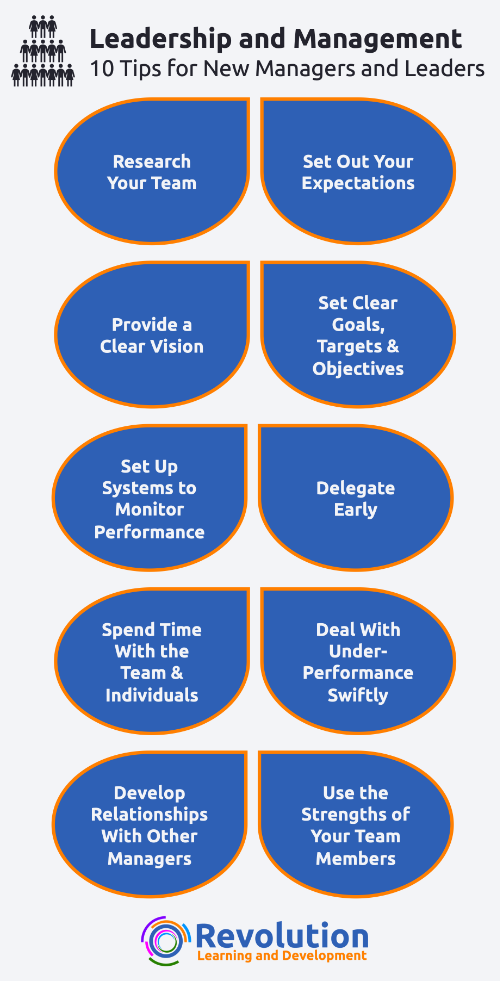Becoming a Leader/Manager
In this post, we share some tips for new managers and leaders. Being promoted into your first leadership/management position is a very exciting time. It shows you are very competent in the role that you do and that you have the skills to effectively lead and manage people.
The first days, weeks, and months in your new role are vitally important. In this period, you can either make things very easy for you and your new team or make it a little more difficult and complex.
This is especially the case if the team you are going to be leading is already an established team or if you are being promoted and are now leading the team you were once part of. You can read more about this in our article Leading a Team You Were Once Part Of.
Your team will have expectations of you. They will be looking for direction, guidance and support. They also need to be confident in your ability to lead, manage, support and mentor them.
It’s at this point that you need to not only meet their expectations but be very clear about your own too.
In the next section, we have provided 10 tips for new managers and leaders that will help you in the early stages of your progression into your role.
10 Tips for New Managers and Leaders
When you create a new team or take over an existing team, according to Bruce Tuckman, there are some predictable stages of behaviour that the team will go through. These are set out in his Team Lifecycle model.
You can read more about the team life cycle modern in the article Tuckman’s Team Development Lifecycle Model.
To help with the initial stages of this cycle, these 10 tips for new leaders and managers will provide some guidance on what you can do to make your progression into a manager or leader go much more smoothly.

10 Tips for New Leaders and Managers:
Here the 10 tips for new leaders and managers. You can use the links to go directly to them.
- Research Your Team
- Provide a Clear Vision
- Set Out Your Expectations
- Set Clear Goals, Targets and Objectives
- Set Up Systems to Monitor Performance
- Delegate Early
- Spend Time With the Team and Individuals
- Deal With Under-Performance Swiftly
- Develop Relationships With Other Managers
- Use the Strengths of Your Team Members
Research Your Team
If you can, find out as much as you can about your new team members. It’s worth asking to meet them before you take over the team. Learn about their skills, behaviours, attitude and also personality.
Be direct. Ask them questions such as ‘what do you want or need from me as your leader/manager?’ or ‘how do you want me to lead/manage you?’. This can be incredibly useful information.
Build a dossier for each team member that includes all of the details above. Understand what jobs each person would be good at and would enjoy doing. You could also build a skills matrix to help with this.
Set Out Your Expectations
One of the most important pieces of advice we give out to new leaders and managers in our Leadership and Management programmes is to set your expectations early. In fact, as early as day one!
Get the team together and talk through how you will lead and manage. Talk about:
- What you want from them
- Your expectations of behaviour and attitude
- How communication should work
- How things will be managed when everything is working well
- How things will be managed when things don’t go so well
- How much freedom they have in decision making
- Where does their level of responsibility start and stop and what does this mean for your accountability
You could make this more of a 2-way discussion by doing an expectations exchange. This is where you set out your expectations of them and the team lay out their expectations of you.
Provide a Clear Vision
The next in our list of tips for new managers and leaders is to provide a clear vision. When we create a vision we create clarity. From clarity comes focus and from focus comes results.
You need to help your team understand where you are trying to get to. Provide an idea of what the next 12, 24 and 36 months look like. Describe clearly what the future holds and what it will look like and feel like when they get there.
Help the team to see the benefits of moving toward this vision. This will help reduce resistance and negativity and help you to get to a high performing team in a shorter time as possible.
It's important to create a vision. When we create a vision we create clarity. From clarity comes focus and from focus comes results. Share on X
Set Clear Goals, Targets and Objectives
Once you have set the vision, now is the time to create the steps required to get there. Essentially, your vision becomes the goal. Now you can set clearly defined targets and objectives that describe how to get there.
Where possible, make these SMART. You can learn more about SMART targets and objectives by reading the article How to Set SMART Objectives.
Set Up Systems to Monitor Performance
It’s all fine and well setting clear goals. targets and objectives, but just as important is understanding how you will monitor progress. This is why this is in our list of tips for new managers and leaders.
You need to understand how you will monitor progress so you can check progress. This is also hugely important for providing constructive feedback.
Share with your team members how you will monitor progress and performance. Better still, allow them where possible to self-serve. If they can monitor their own progress, they are able to make the necessary adjustments required to get back on track themselves without your intervention.
It’s useful to set up dashboards and reports that display this information clearly and that you can use to effectively communicate with your team members.
Delegate Early
Get into the habit of delegating tasks as this sets that expectation early that you will be delegating. It also shows the team that you are willing to trust them and that you are there to develop their skills.
Use the research and dossiers that you created from tip 1 to best understand who to delegate to. You can read more about delegating effectively by reading the article How to Delegate Tasks to Your Team – 6 Steps for Effective Delegation.
Spend Time With the Team and Individuals
The next of our tips for new managers and leaders seem common sense. It is, but it’s one that often gets missed – especially in the early stages where the task or tasks may take priority. Plan time to spend with both the team as a group and the individuals within it.
Hold team meetings, one-to-ones and even focus groups with selected team members who are working on the same tasks.
If you don’t communicate or assume that communication is happening without you, you will soon find that the team begins to make their own decisions – and those decisions may take the group away from your vision.
Deal With Under-Performance Swiftly
When you are a new leader or manager, you feel the need to allow some lapses in performance or behaviour to go by without being discussed. This can set a dangerous precedent as it can show the team that this is acceptable to you. It means they will do it again.
They may even test the boundaries by pushing this even further to see where you will eventually step in. This happens during the Storming stage of Tuckman’s Team Lifecycle model where the team test the tolerance levels of the leader/manager.
If you have clearly set your expectations as described in tip 1, then use these expectations as an anchor point to come back to. If under-performance occurs, call it out by having a conversation. It doesn’t need to be too serious. You just need to let the team or the individual team member know that you are aware of it and remind them once again of your expectations.
If it continues, you may want to consider taking more formal action.
Develop Relationships With Other Managers
The next of our tips for new managers and leaders is to build relationships with other managers and leaders. You are going to need a support network and your colleagues are the perfect group to build this network with. Who else will understand the challenges you will face, the business and the goal better than others in your position?
They will become a great source of information and comfort so do this as soon as possible. Take the initiative to go and introduce yourself to others in the business and start to build those relationships.
Use the Strengths of Your Team Members
The last of our 10 tips for new managers and leaders is to use the strengths of your team members. It’s important to recognise that even as a leader or manager you can’t be good at everything. You can’t expect to be knowledgeable in all areas. So, use the strengths that you have in the team to fill these gaps.
This may be seen as a weakness. In fact, it’s a key strength of all successful leaders and managers. Recognising that you will need the help of those you are leading.
The team will appreciate you for this too as it increases engagement and motivation.
Further Learning
These are just 10 tips for new managers and leaders. Each of our leadership and management courses contains, even more, to help you in your role, even if you are an existing leader or manager looking for more. You can learn more about the courses that we offer by taking a look at the page containing our Leadership and Management Training Courses.



